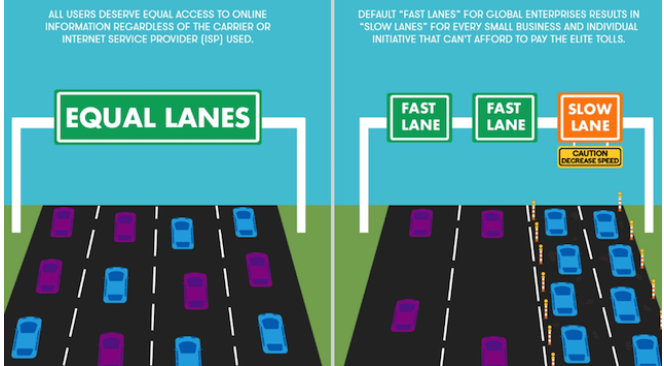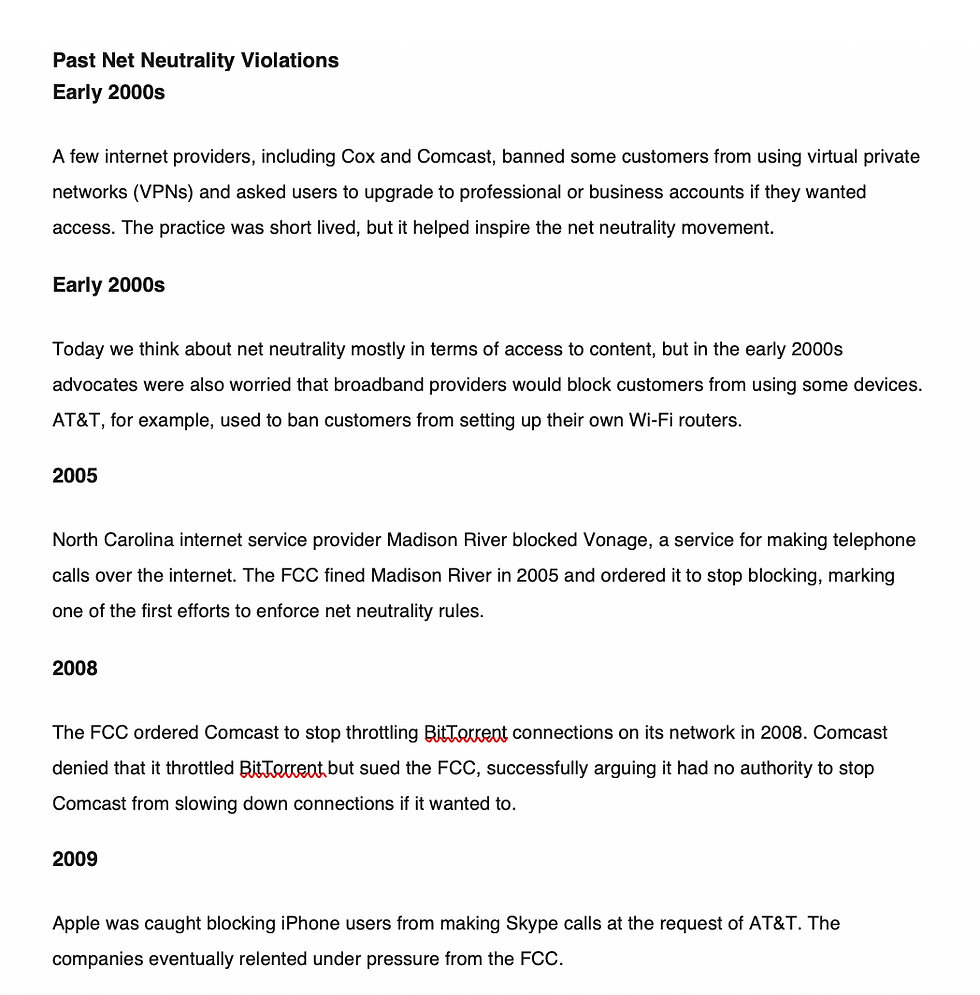Net Neutrality - Perhaps I Was Wrong?
- Lucian@going2paris.net

- May 25, 2020
- 6 min read

Charlottesville, Virginia
May 25, 2020
Remember 2017? The news in the first half of the year was all about the FCC's move to repeal "net neutrality." There were a number of pundits and journalists that suggested we, the consumers would be hurt by the repeal. I bought into their argument. I thought the end of net neutrality fell into the same bucket as the Trump Administration's war on climate change. When I saw a photo of the chairman of the FCC, I had a visceral reaction - BOO!
So what's happened since? Were the naysayers correct?
I'm guessing they were not as I can't find any news articles that compare what they thought was going to happen to what we have today. I did find some partisan pieces that said "we were right, you were wrong" on both sides with little if any data supporting their position.
The best neutral perspective I found was the following from Wired this month. In case you are interested:
Net Neutrality is the idea that internet service providers (ISPs) like Comcast and Verizon should treat all content flowing through their cables and cell towers equally. That means they shouldn't be able to slide some data into “fast lanes” while blocking or otherwise discriminating against other material. In other words, these companies shouldn't be able to block you from accessing a service like Skype, or slow down Netflix or Hulu, in order to encourage you to keep your cable package or buy a different video-streaming service.
The FCC spent years, under the Bush and Obama administrations, trying to enforce net neutrality protections. After a series of legal defeats at the hands of broadband providers, the FCC passed a sweeping net neutrality order in 2015. But in December 2017, the now FCC voted to jettison that order, freeing broadband providers to block or throttle content as they see fit unless Congress or the courts block the agency's decision.
Net neutrality advocates have long argued that keeping the internet an open playing field is crucial for innovation. If broadband providers pick favorites online, new companies and technologies might never have the chance to grow. For example, had internet providers blocked or severely limited video streaming in the mid-2000s, we might not have Netflix or YouTube today. Other advocates highlight the importance of net neutrality to free expression: a handful of large telecommunications companies dominate the broadband market, which puts an enormous amount of power into their hands to suppress particular views or limit online speech to those who can pay the most.
Most large broadband providers promised not to block or throttle content ahead of the ruling, but all four major mobile carriers began slowing down at least some video content before the FCC had fully repealed the rules. Net neutrality advocates worry things could get worse. A broadband provider might, for example, allow some companies to pay for priority treatment on broadband networks. The fear is that, over time, companies and organizations that either can't afford priority treatment, or simply aren't offered access to it, will fall by the wayside.
The History of Net Neutrality
Columbia University law professor Tim Wu coined the term "network neutrality" in a 2003 paper about online discrimination. At the time, some broadband providers, including Comcast, banned home internet users from accessing virtual private networks (VPNs), while others, like AT&T, banned users from using Wi-Fi routers. Wu worried that broadband providers' tendency to restrict new technologies would hurt innovation in the long term, and called for anti-discrimination rules.
The Bush-era FCC took a first pass at anti-discrimination rules for the internet in a policy statement in 2005. It prohibited internet service providers from blocking legal content or preventing customers from connecting the devices of their choosing to their internet connections. Under this policy, the FCC ordered Comcast in 2008 to stop slowing connections that used the peer-to-peer file-sharing software BitTorrent, which was often used for digital piracy but also had legitimate uses. Comcast sued the FCC, arguing the agency had overstepped its bounds. A federal court agreed, ruling that the FCC had failed to make the legal case that it had the authority to enforce the 2005 policy statement.
Wait, What's a Common Carrier Again?
Certain services and businesses have been seen as so crucial to the functioning of society and the economy that governments dating back to Ancient Rome have passed special laws to ensure open access to them. In exchange for serving the entire public, as opposed to being able to pick and choose customers, common carriers were often rewarded with legal benefits, such as special access to public property. For example, railroads -- long treated as common carriers in the US -- are allowed to lay tracks across public land. Today, telephone providers are classified as common carriers, and in the dialup era internet providers were considered to be their customers. If it hadn't been for their common carrier status, telcos might have gotten away with charging customers more to access the internet than to make traditional voice calls, as they tried to do in the 1990s.
In 2010, the Obama-era FCC passed a more detailed net neutrality order that it hoped would stand up to legal scrutiny. But the agency was sued again, this time by Verizon, and in 2014 the same court ruled the agency didn't have the authority to impose net neutrality regulations on services that weren't considered common carriers under Title II of the Communications Act, like traditional telephone services.
Later that year, the FCC floated a new proposal that net neutrality proponents worried would allow internet "fast lanes." The idea drew the ire of comedian John Oliver, who encouraged viewers of his show Last Week Tonight to file comments to express their support for net neutrality. The flood of comments crashed the FCC's website. The agency eventually received 21.9 million comments on the issue, shattering the record previously held by Janet Jackson's 2004 Super Bowl "wardrobe malfunction."
Then-FCC chair Wheeler eventually changed tack and decided to reclassify broadband providers as Title II carriers, though with fewer obligations than landline telephone operators. The FCC passed its sweeping net neutrality order in 2015, and was again sued by telecommunications firms. The same federal court that shot down the FCC’s previous attempts at net neutrality rules finally sided with the agency, ruling that the 2015 rules were legal. An industry group appealed that decision to the Supreme Court, which has yet to hear the case.
Meanwhile, control of the FCC changed as a result of the 2016 election. In January 2017, President Trump appointed Republican FCC Commissioner Ajit Pai as the agency's new chair. In April, he announced a plan to reverse the 2015 net neutrality order. The FCC website was once again flooded with comments. But this time, observers noticed that a huge number of comments, many of which opposed net neutrality, were filed not by people but by bots.
The December 2017 FCC vote effectively threw out the 2015 rules in their entirety. The FCC's new rules drop the common-carrier status for broadband providers, as well as any restrictions on blocking or throttling content. In place of those restrictions, the new rules only require that internet service providers disclose information about their network-management practices. It will now be up to the Federal Trade Commission to protect consumers from alleged net neutrality violations. But the FTC is only an enforcement agency: It can’t create new rules. That means that unless a net neutrality violation is also illegal under existing fair-competition laws, there’s not much the agency can do about it. Outright blocking a competitor may well be an antitrust violation, but creating fast lanes for companies that pay extra for special treatment might not be.

The Future of Net Neutrality
The future of net neutrality is now in the hands of Congress, the courts, and the states. Twenty-one state attorneys general sued the FCC in January 2018 to block the new rules and restore the old ones; so did several consumer-advocacy groups. A federal court decided mostly in the FCC’s favor in 2019 but ruled that the agency couldn’t override state-level net neutrality laws.
Several states have already passed such laws. Washington became the first in March 2018, and Oregon followed soon after. California passed one of the most comprehensive net neutrality laws of all, but the rules are currently on hold amidst a legal challenge from the federal government. Governors of Hawaii, Montana, New Jersey, New York, and Vermont have passed executive orders banning state agencies from doing business with broadband providers that don't uphold the principles of net neutrality.
In the meantime, you can expect broadband providers to slowly take advantage of their new freedom. They probably won’t take big overt steps to slow down or block competing services, especially not while courts are still deliberating the FCC’s latest decision. But you can expect to see more of the practices that carriers already employ, like letting their own content bypass data limits. For example, AT&T lets you watch its DirecTV Now video service without having it count against your data plan, but watching Netflix or Hulu still chews through your limit.


Commentaires